|
 Secure Site
Secure Site
|
 |
Archive for the 'sleep' Category
 yoga can help you relax and sleep Put away your pills and roll out your yoga mat. These yoga poses help relieve insomnia.
When was the last time you had a good night’s rest? According to the National Sleep Foundation, sleep deprivation is on the rise: As many as 71 percent of Americans get far less than the recommended eight hours.
There are two primary categories of sleeplessness, says Judith Hanson Lasater, Ph.D., P.T., author of Relax and Renew: Restful Yoga for Stressful Times. One is physiological (too much coffee or alcohol, hormonal changes, illness, jet lag); the other is psychological (stress, worry, unresolved conflict).
“You may hold your thoughts at bay all day long,” explains Lasater, “but when you sleep, they’re still spinning in your mind.”Yoga helps slow the spin, she says, adding, “It’s not that you go to sleep and then relax—it’s that you get relaxed and then go to sleep.”
Poses that support you completely with props are the key to creating a relaxed body and mind. “When you feel supported, the only response is relaxation,” Lasater notes. This sleep-enhancing set includes Side-Lying Corpse Pose, which teaches “total release, total softening,” she says: “It’s the ultimate form of letting go.The focus is directed inward to shift you from doing to being.”
Do these 3 poses one after the other. If you wake up sleepless in the middle of the night, leave your bed and do any of the 3 you choose.
Supported Reclining Pose
- Place a pillow on your mat,along with a folded blanket to support your head. Roll 3 additional blankets.
- Sit in front of the pillow with your tailbone at its edge. Bend your knees and place a blanket roll underneath.
- Lean back and rest your torso on the pillow and your head on the folded blanket. Let your heels rest on the mat. Place each forearm on a rolled-up blanket, both palms turned up.
- Take several long,deep breaths. As you exhale,allow your belly to drop into your pelvis. Feel the tension melt away. Stay here for at least 15 minutes.
Simple Supported Backbend
- Stack 2 blankets, one folded around the other,and place them horizontally on the mat.
- Sit on the mat with your back to the blankets, your knees bent, and your feet flat. Lean back and place your elbows on the blankets for support and balance.
- Slowly roll backward until your lower back is completely supported by the blankets and your head is on the mat. Bring your arms out to your sides, palms turned up. Close your eyes.
- Breathe slowly and evenly, allowing your body to soften. Stay here for 1 minute, then gradually increase your time in the pose.
Side-Lying Corpse Pose (Caution: If you are more than 3 months pregnant, lie on your left side only.)
- Sit on your mat with your props—2 folded blankets and 2 king-sized pillows—nearby. Lean on one arm, then lower yourself to the mat so you’re lying on your side with your knees bent.
- Place one blanket under your head and the other between your knees, shins, and ankles.
- Place one pillow lengthwise in front of you and the other behind you so you’re lying between them; hug the front pillow as you relax into both. Close your eyes and take several slow, easy breaths. Relax your jaw and eyes. Stay here for 20 minutes.
Use our unique “Zen Clock” which functions as a Yoga Timer. It features a long-resonating acoustic chime that brings your meditation or yoga session to a gradual close, preserving the environment of stillness while also acting as an effective time signal. Our Yoga Timer & Clock can be programmed to chime at the end of the meditation or yoga session or periodically throughout the session as a kind of sonic yantra. The beauty and functionality of the Zen Clock/Timer makes it a meditation tool that can actually help you “make time” for meditation in your life. Bring yourself back to balance.
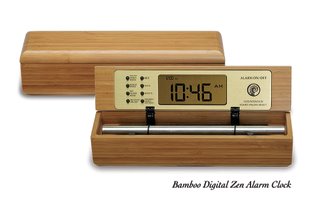 Chime Yoga Timers and Alarm Clock
adapted from Natural Health Magazine, by Nora Isaacs
 Natural Wake Up Clock with Chime Now & Zen – The Yoga Timer Store
1638 Pearl Street
Boulder, CO 80302
(800) 779-6383
Posted in sleep, Sleep Habits, Well-being, yoga, Yoga Timer, Yoga Timers by Now & Zen
 tea solutions What it is
A member of the mint family, lemon balm has a distinct lemony flavor and aroma, which makes it a popular garden herb. Although it’s mild enough to use for treating children’s ailments, lemon balm is a powerful herbal healer for adults as well.
Why it’s used
Herbalists today primarily use lemon balm for easing insomnia, anxiety, stress, and digestive upsets. It is also used to ward off insects and heal bug bites. The recent discovery of the herb’s antiviral compounds has made it popular as a topical treatment for oral and genital herpes.
History and folk remedies
Lemon balm has been cultivated for more than 2,000 years as a medicinal plant. As early as the tenth century, Arab physicians recommended the flavorful herb for easing nervous tension. In medieval Europe, extracts of lemon balm became a fashionable sedative; the emperor Charlemagne decreed that the herb be grown in every monastery garden in his domain. Throughout the Middle Ages, herbalists prescribed lemon balm for insomnia, headaches, nervous stomach, anxiety, depression, and menstrual cramps. From the time of ancient Greece, lemon balm was also used to help heal minor wounds and to treat bug bites and stings.
How it works
Researchers have identified a variety of compounds in lemon balm with mildly sedative properties that relax the nervous system. Other compounds, including fragrant essential oils, help to relieve indigestion. The plant contains polyphenols, compounds that fight infection-causing bacteria; this supports the traditional use of lemon balm for healing wounds. Laboratory studies also show that lemon balm has antiviral properties. Scientists theorize that the herb prevents viruses from attaching to cells.
Scientific support
In a German study, lemon balm combined with valerian (Valeriana officinalis) was found to significantly improve sleep quality when compared with a placebo (Fitoterapia, 1999, vol. 70, no. 3). Another study showed that the same herbal formula was as effective as the pharmaceutical tranquilizer Halcion but without the negative side effects typical of sedative drugs (Therapiewoche, 1992, vol. 42).
 lemon balm The botanical name Melissa comes from the Greek word for bee, because bees love this flowering herb. German researchers have also proven the effectiveness of lemon balm as a herpes treatment. In a recent study, 116 people with herpes sores (oral and genital) were given either a cream containing 1 percent lemon balm extract or a placebo. Those using the herb had a significantly better recovery rate than those using the placebo (Phytomedicine, 1994, vol. 1, no. 1). Another study followed 66 individuals just starting to develop a cold sore. On day two, those using the lemon balm cream were healing more quickly, had less discomfort, and exhibited fewer and smaller blisters than those not taking the herb (Phytomedicine, 1999, vol. 6, no. 4).
Dose
To make a lemon balm tea, pour 1 cup of boiling water over 2 teaspoons of dried leaf (or 2 tablespoons of fresh leaves). Set your Zen Timer with Chime for 15 minutes. Cover, steep for 15 minutes, strain, and drink. For insomnia, drink 1 cup 30 minutes before bed. For stress and anxiety, drink up to 3 cups throughout the day. If you prefer using a concentrated liquid extract, take 1/2 to 1 teaspoon diluted in a small amount of warm water up to three times a day.
adapted from Delicious Living, July 2004 by Laurel Vukovic
“The Zen Alarm Clock & Chime Timer’, uses soothing acoustic chimes that signal it’s time – gently and gradually.
Rather than an artificial recorded sound played through a speaker, the Zen Clock features an alloy chime bar similar to a wind chime. When the clock’s alarm is triggered, its chime produces a long-resonating, beautiful acoustic tone reminiscent of a temple gong.
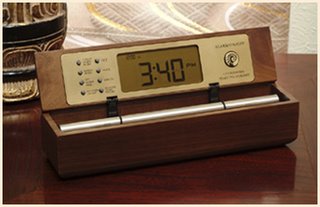 Digital Zen Timer with Chime, a good timer for lemon balm tea Now & Zen’s Chime Timer Store
1638 Pearl Street
Boulder, CO 80302
(800) 779-6383
Posted in Bamboo Chime Clocks, sleep, Sleep Habits, Well-being, Zen Timers
 Feng Shui your bedroom for a better rest Use Feng Shui principles to set up your bed and you could wake up more rested.
Use Feng Shui principles to set up your bed and you could wake up more rested, according to Ellen Whitehurst, a feng shui consultant and author of the upcoming book Make This Your Lucky Day (Ballantine, 2007). The goal is to balance the energy in your bedroom so you can relax-to do this, start by placing the head of your bed against a wall, which will give you a feeling of stability (a headboard has the same effect). But don’t put your bed in a corner. “Leave space on both sides of your bed so energy can circle freely around you,” says Whitehurst. If possible, move your bed so you can see your door without being directly across from it-or in front of a window. This arrangement, called “the command position,” will subconsciously make you feel more secure by allowing you to see who is coming into your room without being startled.
Boulder, Colorado—an innovative company has taken one of life’s most unpleasant experiences (being startled awake by your alarm clock early Monday morning), and transformed it into something to actually look forward to. “The Zen Alarm Clock,” uses soothing acoustic chimes that awaken users gently and gradually, making waking up a real pleasure.
What makes this gentle awakening experience so exquisite is the sound of the natural acoustic chime, which has been tuned to produce the same tones as the tuning forks used by musical therapists. According to the product’s inventor, Steve McIntosh, “once you experience this way of being gradually awakened with beautiful acoustic tones, no other alarm clock will ever do.”
adapted from Natural Health Magazine
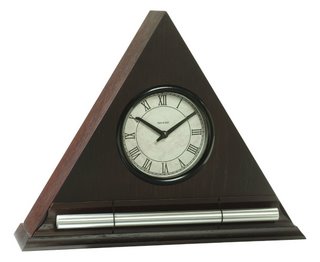 Chime Alarm Clock, the original progression wake up clock with soothing Feng Shui Chime to awaken you gently Now & Zen – The Peaceful Alarm Clock Store
1638 Pearl Street
Boulder, CO 80302
(800) 779-6383
Posted in Feng Shui, sleep, Sleep Habits, Well-being
 Morning You don’t have to be a naturally early riser to enjoy all that the morning has to offer. With the right perspective and a few small adjustments, you can turn your morning into one of the most relaxing and energizing parts of your day.
“The morning has incredible potential,” says Alison Novie, senior yoga instructor at Kula Yoga in Manhattan. “I think of the new day as a new year — a whole new life. If you could modify just a few things about your morning, it would change the way you see your day.”
To some degree, you don’t have much choice about how you feel when the sun comes up. Not everyone is born a morning person. But that doesn’t mean your mornings can’t change for the better. It’s worth tinkering with your natural inclinations to reap the rich rewards.
Quiet, full of expectation, yet uncluttered by conversation and untouched by the demands of the day, the morning presents an opportunity for you to find joy, peace, and strength — or at the very least, the chance to ease into the flow so that you aren’t thrown into your day headlong and half awake. We’ve spoken with a renowned sleep expert, a yoga instructor, and a Reiki healer for their insights on everything from getting a good night’s sleep to practicing mind/body awareness to incorporating a sense of play early in the day. Their strategies work well together or individually. Find the ones that work for you, and enjoy them in and around your current morning chaos, whether you live alone, with two dogs, or with five kids. By taking the time to stimulate your senses and relax your body and mind, you’ll start out calmer, more energized, and better prepared for whatever lies ahead.
Reset Your Natural Alarm
First things first: You’ll never enjoy the morning if you don’t get a good night’s sleep. For some people, that means a solid nine hours of uninterrupted slumber; for others, seven hours of shut-eye will do. Sleep expert James B. Maas, Ph.D., author of Power Sleep, notes that eight hours of sleep is the average — but only an average, not a rigid goal. When you’re not getting enough sleep, you’re the first to know. Shifting your sleep schedule is possible, says Maas, but it requires commitment. “If you’re a night person, and you want or need to become a day person, you can do it, but you have to be serious about it. You can’t flip-flop,” he advises. Here’s how to alter your habits in favor of an earlier (and happier) morning.
Make a gradual shift. If you find it hard to fall asleep at night, take things slowly when it comes to establishing a new time for bed. Try hitting the hay five minutes earlier each night, and in less than two weeks you will have shifted your bedtime by one hour.
Resist the urge to snooze. Hitting the snooze bar is an exercise in futility — and torture. You’ll get at best 5 or 10 minutes of fragmented sleep, notes Maas, and may arise feeling groggier than when your alarm first went off. Instead of sneaking in 10 more minutes of sleep, try going to bed 10 minutes earlier instead.
Expose yourself to bright daylight. This is one of the best and most effective things you can do to wake yourself up, says Maas. By opening the curtains and the windows or getting outside, you cue your brain to repress the production of melatonin, the hormone that regulates sleep. Natural daylight works best, but if you get up before sunrise or simply can’t get enough natural light, consider using a sun-mimicking device as an alternative.
Don’t lose sleep over exercise. While you may choose to exercise in the morning, Maas recommends against sacrificing sleep for it. “Never truncate your sleep in order to work out. This puts you at a greater risk of injury,” he advises. Only when you have had enough uninterrupted hours of sleep should you think about getting up to exercise.
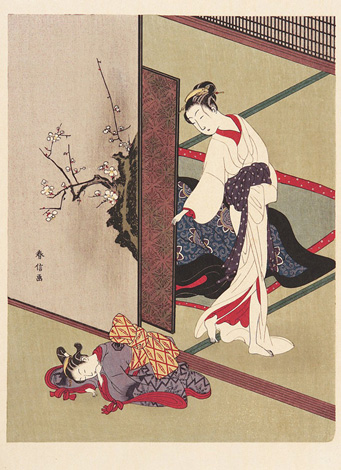 Chime Alarm Clocks and Meditation Timers - Mother and daughter Harunobu Be consistent. “You don’t get two biological clocks — one for weekdays and one for weekends,” says Maas. “That means you have to stick by one.” Sleeping late on the weekends to compensate for lack of sleep during the week will throw you off, making Monday mornings even worse than they need to be. While keeping a consistent sleep schedule is ideal, it’s not always reasonable or practical. Your best bet is to try to keep your schedule fairly regular (that is, getting up and going to bed within an hour or so of your weekday schedule).
Plan your evenings. How you wind down the day may affect the quality of your sleep — and therefore the quality of the following morning. For some, eating a chocolate bar, watching a dramatic movie, or arguing right before bed will be enough to derail sleep. Be aware of your particular sensitivities; avoid those things you know will keep you up.
Boulder, Colorado—an innovative company has taken one of life’s most unpleasant experiences (being startled awake by your alarm clock early Monday morning), and transformed it into something to actually look forward to. “The Zen Alarm Clock,” uses soothing acoustic chimes that awaken users gently and gradually, making waking up a real pleasure. Rather than an artificial recorded sound played through a speaker, the Zen Clock features an alloy chime bar similar to a wind chime. When the clock’s alarm is triggered, its chime produces a long-resonating, beautiful acoustic tone reminiscent of a temple gong. Then, as the ring tone gradually fades away, the clock remains silent until it automatically strikes again three minutes later. The frequency of the chime strikes gradually increase over ten-minutes, eventually striking every five seconds, so they are guaranteed to wake up even the heaviest sleeper. This gentle, ten-minute “progressive awakening” leaves users feeling less groggy, and even helps with dream recall.
adapted from Body +Soul Magazine, March 2006
Now & Zen’s Chime Alarm Clock Store
1638 Pearl Street
Boulder, CO 80302
(800) 779-6383
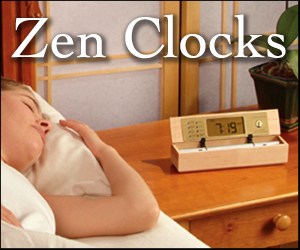 Chime Alarm Clocks - The Digital Zen Alarm Clock
Posted in Chime Alarm Clocks, Natural Awakening, sleep, Sleep Habits, wake up alarm clock, Well-being
 connect with nature in the morning Mornings are sacrosanct for Reiki master and energy healer E. Barrie Kavasch, a descendent of the Cherokee and Creek tribes and author of more than 15 books on Native American culture, including The Medicine Wheel Garden. “Our own internal wisdom knows this,” Kavasch explains. “We come from origins that tell us we should be up and about.” Growing up on a family farm in Tennessee, Kavasch and her siblings would wake up before dawn to milk the cows. “Our days would be filled with energy and enthusiasm. We would have done so much by 8:30 a.m.,” she says. “I can’t imagine a morning without being in close touch with nature.” Even those not living on a farm can gain from the enlivening benefits nature will bring to the tired human body.
Step outside. In many ways, getting outdoors provides the best way to get your mind and body in sync with the morning. “The first thing I do each morning is get up and go out for a walk. I fill my lungs with the morning air,” says Kavasch. Even if you don’t have time for a walk, simply stand out in the morning light to get connected with the world around you.
Open a window. If you can’t get out, bring the fresh air in. Pull open the blinds and open a window to let in the light, smells, and sounds of a new day.
See blue. Among the Pueblo and Navajo people, says Kavasch, seeing turquoise first thing in the morning is considered a blessing. This helps explain why they’ll often paint a portion of their windowsills or door frames in this brilliant color. “Turquoise is considered a sky stone, reminding us of when the sky is at its brightest and sunniest,” says Kavasch. “To see it upon first opening your eyes is a blessing for the hours that follow.” To set the stage for a better morning, try keeping a turquoise stone, bracelet, necklace, or colored item by your bedside or in your window so you see it first thing in the morning.
Water your plants. Invite nature into your home by placing houseplants throughout; then take time each morning to water and care for them. Just touching and focusing on this element of nature can gently draw you into the new day.
Enjoy a taste of nature. A bite of fresh fruit or a sip of juice can recall a vital connection to the natural world and help gently awaken your senses. Think of that taste as more than food; it represents nature’s bounty.
Waking up in the morning should be as pleasant as falling asleep at night. The Zen Alarm Clock’s gradual, gentle awakening is transformative.
Boulder, Colorado—an innovative company has taken one of life’s most unpleasant experiences (being startled awake by your alarm clock early Monday morning), and transformed it into something to actually look forward to. “The Zen Alarm Clock,” uses soothing acoustic chimes that awaken users gently and gradually, making waking up a real pleasure.
adapted from Body + Soul, March 2006
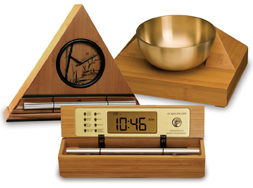 Singing Bowl and Chime Alarm Clocks and Timers Now & Zen’s Soothing Chime Alarm Clock
1638 Pearl Street
Boulder, CO 80302
(800) 779-6383
Posted in Chime Alarm Clocks, Now & Zen Alarm Clocks, Progressive Awakening, sleep, Sleep Habits
 how to increase sleepiness Your body needs to sleep in near-total darkness for optimum health. Darkness prompts the pineal gland to produce melatonin, a hormone that increases both sleepiness and length and quality of sleep. Too much light can compromise melatonin production, interfering with slumber. Some studies have suggested that low melatonin levels may be linked to a higher risk of breast cancer, although the more common result of a too-bright room will be a poor night’s sleep. Use an eye mask or install light-blocking shades over your windows to prevent street lamps — even a full moon — from disrupting your sleep. Products to try: Gaiam’s silk sleep mask (gaiam.com). Be sure to wake naturally in the morning with a Chime Alarm Clock by Now & Zen.
Boulder, Colorado—an innovative company has taken one of life’s most unpleasant experiences (being startled awake by your alarm clock early Monday morning), and transformed it into something to actually look forward to. “The Zen Alarm Clock,” uses soothing acoustic chimes that awaken users gently and gradually, making waking up a real pleasure.
What makes this gentle awakening experience so exquisite is the sound of the natural acoustic chime, which has been tuned to produce the same tones as the tuning forks used by musical therapists. According to the product’s inventor, Steve McIntosh, “once you experience this way of being gradually awakened with beautiful acoustic tones, no other alarm clock will ever do.”
adapted from Body + Soul Magazine, February 2006
 Chime Alarm Clock for a Progressive Awakening Now & Zen – The Zen Alarm Clock Shop
1638 Pearl Street
Boulder, CO 80302
(800) 779-6383
Posted in Natural Awakening, Progressive Awakening, sleep, Sleep Habits, wake up alarm clock, Well-being
 Lack of Sleep Although the occasional all-nighter is OK, people who regularly skimp on z’s can’t undo sleep deprivation’s detrimental effects by simply hitting the snooze button on weekends, says a new study in the journal Science of Translation Medicine. Contrary to popular belief, the energy you feel after a Saturday morning sleep session is only short lived, according to the study. Chronic sleep loss has a cumulative effect on performance.
Why? Lack of sleep raises levels of the stress hormone cortisol and affects a person’s ability to respond to stimuli, says Catherine Darley, ND, founder of Seattle’s Institute of Naturopathic Sleep Medicine. Sleep also plays a key role in mood regulation and overall physical and mental functioning. If you need some extra help falling asleep, try a natural insomnia supplement made with melatonin, tryptophan, or valerian.
Remember,waking up in the morning should be as pleasant as falling asleep at night. The Zen Alarm Clock’s gradual, gentle awakening is transformative. “The Zen Alarm Clock,” uses soothing acoustic chimes that awaken users gently and gradually, making waking up a real pleasure. What makes this gentle awakening experience so exquisite is the sound of the natural acoustic chime, which has been tuned to produce the same tones as the tuning forks used by musical therapists. According to the product’s inventor, Steve McIntosh, “once you experience this way of being gradually awakened with beautiful acoustic tones, no other alarm clock will ever do.”
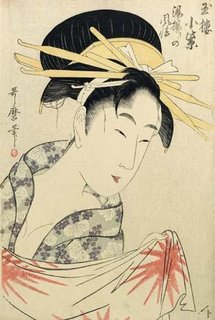 Waking in the Morning, Kitagawa Utamaro, Komuraski of the Tamaya, House After a Bath, 1795 adapted from Natural Solutions Magazine By Stacy Lindsay, 8/2010
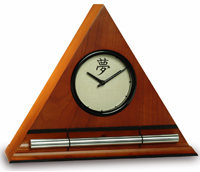 Gradual, Soothing Chime Alarm Clocks
Now & Zen – The Zen Alarm Clock Store
Chime Alarm Clocks with Progressive Awakening
1638 Pearl Street
Boulder, CO 80302
(800) 779-6383
Posted in Bamboo Chime Clocks, Now & Zen Alarm Clocks, sleep, Sleep Habits
 how to get back to sleep One minute, you’re in the deep REM zone. The next, it’s 3 a.m. and you’re wide awake, eyes flung open, heart pounding, mind racing like a runaway train — “Will I meet that deadline?” “Did I turn off the stove?”
You lie there flustered, tossing and turning, until finally you give up — and spend the next few hours zoned out on the couch watching infomercials.
While you can’t ignore late-night anxiety, you can find calm by facing it head on. “Mindfulness makes you aware of the uncomfortable physical sensations that bubble up when your brain refuses to rest,” says stress and relaxation expert KRS Edstrom, creator of the Sleep Through Insomnia meditation CD. “It helps break up those I-can’t-fall-back-to-sleep thoughts, and lets your mind know it doesn’t have to panic anymore.”
When insomnia strikes, she suggests briefly getting out of bed (get a drink of water, gently stretch) to break the initial agitation. Then lie back down and, using the following visualization technique, focus your attention on how you feel. By observing the tension in your body, you’ll be better able to let it go and catch those precious remaining hours of rest.
Meditation How-To
1. Lie on your back, close your eyes, and take three deep, slow breaths through your nose.
2. Turn your attention to where the panic or tension resides in your body. Is it your head? Throat and neck? The pit of your stomach?
3. Observe the sensation. Does it feel dull, sharp, prickly, hot? Describe it to yourself objectively, without trying to make it stop or go away.
4. Now imagine drawing a circle around that spot with a marker.
5. Breathe deeply in and out for a few moments, watching the circle expand and shrink. Notice whether the intensity swells, plummets, or changes shape over time. As you relax, begin to envision the circle slowly melting away.
6. As the circle dissolves, let your body grow heavy; imagine that your bones are made of lead, sinking deeper and deeper into the bed. Feel a wave of relaxation flow over you, washing away your remaining anxiety, like sand being drawn out to sea.
7. Drift blissfully to sleep.
The Digital Zen Clock and Meditation Timer serves as a countdown and interval timer for yoga, meditation, bodywork, etc.; and it can also be set to chime on the hour as a tool for “mindfulness.”
adapted from Body + Soul Magazine, September 2008
 Natural Sounding Alarm Clocks, The Digital Zen Alarm Clock in Solid Walnut Now & Zen’s Meditation Timer Shop
1638 Pearl Street
Boulder, CO 80302
(800) 779-6383
Posted in intention, Meditation Timers, mindfulness practice, sleep, Sleep Habits, Well-being
 wake up naturally I recently taught my students about chronobiology—the study of cycles in organisms. We talked about the importance of a good night’s sleep, which is greatly aided by allowing sunlight and moonlight to synchronize our internal cycles. This means gradually awakening to morning sunlight and allowing our bodies to relax before bedtime by avoiding bright light.
Taylor had been troubled by insomnia. After this class, she was ready for a change. A few hours before bedtime, she turned off bright lights around the house and wrapped up her computer use for the day (the light from a monitor can throw off your biological clock). An hour before bedtime, she lit candles and turned off all electric lights. By candlelight, she bathed, got into her night clothes and meditated before falling into a deep, peaceful sleep. In the morning, she was awakened by the gradually increasing sunlight and her chime alarm clock with progressively increasing natural acoustic sound by Now & Zen. She came to class glowing with refreshment and a new sense of empowerment. Now Taylor understands that her body needs a relationship with natural cycles of light and dark. “I’m not nearly as groggy as I used to be,” she says. “Light really is stimulating!”
adapted from Natural Home Magazine, September/October 2009 by Carol Venolia
If you don’t have the luxury to gently wake up to by light — try the next best alternative…waking gently to soothing chimes. Out Soothing Digital Chime Clock’s long-resonating Tibetan bell-like chime makes waking up a beautiful experience – its progressive chimes begin your day with grace.
Carol Venolia is an eco-architect and co-author of Natural Remodeling for the Not-So-Green House (Lark Books, 2006). She teaches in the Sustainable Communities program at Dominican University of California.
 Gentle Chime Clock to help you Naturally Wake-Up Now & Zen’s Natural Chime Alarm Clock Store
1638 Pearl Street
Boulder, CO 80302
(800) 779-6383
Posted in Chime Alarm Clocks, Natural Awakening, nature, Progressive Awakening, sleep, Sleep Habits, wake up alarm clock, Well-being
 how to have get more energy When it comes to cultivating energy, you probably never did it better than when you were a toddler. You’d come barreling out of bed in the morning, eyes wide and arms full of toys. These days, you’re lucky if you can rouse yourself with multiple alarm clocks and a few cups of coffee. Snacks, if you have time to eat them, aren’t the healthy kind. As for naps and early bedtimes, they happen on rare, unplanned occasions, usually when you’re down with a cold or flu, or exhausted from running yourself ragged all week. With habits like these, it’s no wonder that more than one-third of Americans say they’re so tired that it interferes with work.
Depleted energy interferes with our lives. Feeling energetic “means having the vitality to do the things you want to do,” says Mark Hyman, M.D., editor-in-chief of the journal Alternative Therapies in Health and Medicine and author of “UltraMetabolism.” That vitality isn’t just a state of mind — it’s a physical condition. Each of our cells contains hundreds of mitochondria, tiny “power plants” that combine the oxygen we breathe with the food we eat and then burn the combination to create energy.
 increase vitality with a mindfulness practice We know this process as metabolism. How energetic we feel largely depends on how well our mitochondria are functioning. To function optimally, they need quality fuel: a wholesome, varied diet, restorative sleep, and plenty of oxygen from regular exercise. But rather than enhance our vitality, we often sabotage it with “counterfeit energy” — stimulants like caffeine that we think give us more pep but only drain our energy in the long run.
Getting your energy back is possible. Start by simply looking at your day. From morning until night, energy leaks abound. These daily habits may seem perfectly innocent, but over time they impair your body’s vitality.
Waking up in the morning should be as pleasant as falling asleep at night. The Zen Alarm Clock’s gradual, gentle awakening is transformative.
The Walnut Digital Zen Clock’s long-resonating Tibetan bell-like chime makes waking up a beautiful experience – its progressive chimes begin your day with grace. When the clock’s alarm is triggered, the acoustic chime bar is struck just once … 3-1/2 minutes later it strikes again … chime strikes become more frequent over 10 minutes … eventually striking every 5 seconds until shut off. As they become more frequent, the gentle chimes will always wake you up – your body really doesn’t need to be awakened harshly, with a Zen Clock you’re awakened more gradually and thus more naturally. Unlike artificial recorded sounds coming out of a tiny speaker in a plastic box, natural acoustic sounds transform your bedroom or office environment.
adapted from Body + Soul, September 2006
 gentle wake up clock with chime
Now & Zen’s Chime Alarm Clock Store
1638 Pearl Street
Boulder, CO 80302
(800) 779-6383
Posted in intention, Meditation Timers, Meditation Tools, mindfulness practice, sleep, Sleep Habits, wake up alarm clock, Well-being
« Previous Page — « Previous Entries
Next Entries » — Next Page »
|
|
|
|